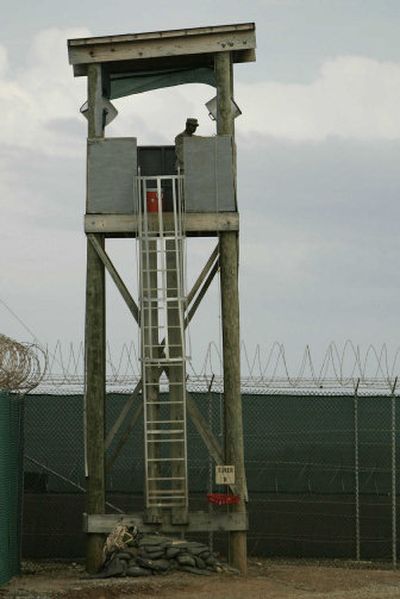Detainees’ cases go slowly

WASHINGTON — One year ago, the Supreme Court issued a landmark ruling that opened the door to federal courts for 500-plus prisoners in the Guantanamo Bay prison camp to challenge their captivity.
But 200 detainees, including some held more than three years, who have filed habeas corpus petitions in federal court haven’t been able to get through that door. After months of procedural battles, no judge has heard the merits of a single Guantanamo case.
As controversy mounts over the treatment of Guantanamo detainees, and the Bush administration argues that prisoners can be held indefinitely without being charged, even some Republican senators have called for a faster resolution of their cases.
“Our whole system is to get people to determine what the facts are, charge them and move ahead,” said Sen. Mike DeWine, R-Ohio, at a recent hearing. “What’s going on here? This seems to be a horribly slow process.”
A habeas corpus petition, in which a prisoner claims he’s being improperly jailed, “is supposed to get fast-track consideration because personal liberty is an urgent issue,” said Eugene Fidell, president of the National Institute of Military Justice.
But that hasn’t happened.
The Center for Constitutional Rights, which helped organize 400 lawyers to represent detainees, has had little lasting success in the year since the Supreme Court’s ruling required hearings on the detentions.
Several factors, including vagueness in the 2004 Supreme Court ruling, have slowed down the pace of litigation in the Guantanamo cases, according to Fidell and other legal and national security experts.
The court, in the 6-3 decision of Rasul v. Bush, settled one important question: It ruled that Guantanamo — a naval base leased from Cuba — isn’t outside U.S. law and that U.S. courts could hear detainees’ claims.
But it didn’t set out a process to do that, leaving it to lower courts.
“.
Fidell was critical: “The court didn’t do what it needed to do. Because it gave no blueprint, we have hundreds of detainees held for years, and their cases have no resolution in sight.”
The Bush administration has resisted judicial review at every juncture. The Defense Department originallysought to bar lawyers’ access to Guantanamo, then wanted to monitor their conversations with detainees, but lost on those issues.
“They have dug in their heels every step of the way,” Ratner said. Justice Department attorneys argued that special military panelsset up last year, gave detainees adequate due process in reviewing their status as enemy combatants. Two federal judges, Joyce Hens Green and James Robertson, rejected that argument; one, Richard J. Leon, agreed.
Even district judges who have ruled against the government have moved methodically, recognizing that appellate judges and eventually the Supreme Court will resolve the major issue of what rights a detainee has in federal court.
Lee Casey, who worked in the Justice Department in two Republican administrations, said that “judges are moving cautiously because of the difficult national security issues involved.”